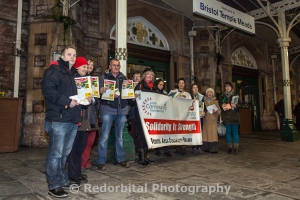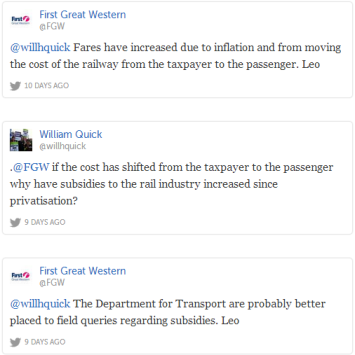On Wednesday the 8th of July at 6:30pm, railway staff organised in The National Union of Rail, Maritime and Transport Workers (RMT) across the First Great Western franchise started a 48 hour strike over the threatened loss of safety, services and jobs on the new Hitachi Intercity Express Trains. The new high-speed Hitachi trains are replacing the old diesel powered fleet that has serviced the South West since the 1970s. The main cause of friction is First Great Western’s decision to remove the train guard and buffet cart (and catering staff) and run driver only trains, as well as a reduction in station dispatch and maintenance staff (and the potential outsourcing of train maintenance). All of which will reduce the cost of running the services and increase First’s profits. On the other side of the equation passengers will receive a reduced level of service, with much depressed safety standards, whilst skilled staff are tossed to one side and thrown into unemployment (a daunting prospect in austerity Britain).
These new trains are being rolled out on both the First Great Western and East Coast Mainline franchises. Along the East Coast Mainline there is no dispute and no strike; as the franchise operator isn’t attacking jobs and services to further engorge their own profits. First Great Western on the other hand has no such scruples. Something the mainstream press coverage of the dispute seemingly forgets. Whilst the Tory press screams about out of touch union militants bringing the country to a standstill and the BBC attempts to trivialise the whole episode into one of commuter disruptions devoid of context; just remember these are workers striking and losing two days’ worth of pay predominantly to protect safety standards for passengers as well as their own jobs.
Obviously the disruption caused to commuters is an annoyance, but it is to protect those very commuters that is motivating these workers to strike. Left to their own devices First Great Western will gouge passengers for everything they have. An open return between Bristol and London has increased in price by 246% since privatisation 20 years ago (far far in excess of inflation). At the same time railways as a whole have seen their subsidy from the taxpayer more than double; between 2011-2014 First Great Western alone received £959.8 million. Passengers are paying the most expensive fares in Europe (and the tax payer’s coughing up huge sums) for substandard services, whilst the First Group makes huge profits and their chairman has increased his pay by 243% in the last 4 years (to £1.6 million). No wonder they don’t think they can afford to pay for safety critical train guards and maintenance staff (and for a catering service to standard class passengers) when their chairman’s taking such a huge kickback.
With such obvious injustices leading to this dispute I went down to the RMT’s Bristol branch meeting that Wednesday night (after the People’s Assembly budget protest), to pass on the local party’s solidarity and speak a little about the centrality of the railways in our plans for a fairer sustainable society. I was very well received (quiet charitably too as I did not speak my best, and definitely should have prepared something to say a lot more), even more so when I passed on a £60 donation from the Peoples Assembly to support the pickets. This was money collected at the budget protest from ordinary Bristolians eager to support the striking workers (I made a very short speech on the megaphone outlining the causes of the dispute and the need to show solidarity, and was mobbed by people keen to help).

RMT members enjoying a hot cup of Solidari-Tea 9/7/15… that white powder in that bag is just sugar… honestly
I went down to the picket on Thursday morning to talk to the picketers and give them some Bristol Green Solidari-Tea and Coffee (still can’t think of an adequate pun…. maybe comradecoffee? no that won’t do). It was an absolutely lovely day, and everyone seemed in high spirits. Whilst I was there a semi-continuous stream of visitors/well wishers coming to show their support, and the response from the public seemed generally very positive. Across the network around 2000 staff participating in the strike and reportedly First Great Western had to cancel 40% of their services. There are reports that some of their other services were only kept running by forcing TSSA staff to do jobs “which they do not feel either qualified or confident to do” – which has led to the union also balloting its members for strike action. The RMT have just rejected FGW’s latest offer – which apparently still does nothing to address the key concerns for safety and jobs around the train guard and maintenance staff – and are planning future strike dates, and with the TSSA presently balloting for action, further strikes seem likely.
Should that happen we’ll be happy to support these workers taking a stand to protect their own jobs and all our safety, and we encourage everyone else to do so too. In these hard times of austerity we need solidarity and compassion more than ever before. Only by working together and magnifying the impact of each others struggles will we have any hope of resisting this repressive government’s attacks on ordinary people and our planet.




 We have some of the highest fares in Europe; for the least reliable service. The only positive achievement the advocates of private ownership can point too is an increase in passenger numbers over the last 20 years. It’s hard to see how the fact that the railways were now owned privately instead of by the state would be likely to influence the average person into using them and directly lead to this increase in passenger numbers as the advocates of privatisation claim. Structural changes to our society have fueled this change – chiefly the spiraling cost of rent and general inner city living which has priced many out of homes close to work and forced them to rely on trains. If the trains were still publicly owned during this period but the same structural changes to employment and accommodation patterns had occurred we would have seen the exact same increase in passenger numbers, possibly more so as Public Ownership can deliver fairer fares. Research by Transport for Quality of Life has shown that if the railways were Publicly Owned we could have the same service as we have today but by eliminating the wastages and inequities produced by a fragmented privately owned system we could have it for £1.2 billion less. That would be enough to cut fares by around 20%.
We have some of the highest fares in Europe; for the least reliable service. The only positive achievement the advocates of private ownership can point too is an increase in passenger numbers over the last 20 years. It’s hard to see how the fact that the railways were now owned privately instead of by the state would be likely to influence the average person into using them and directly lead to this increase in passenger numbers as the advocates of privatisation claim. Structural changes to our society have fueled this change – chiefly the spiraling cost of rent and general inner city living which has priced many out of homes close to work and forced them to rely on trains. If the trains were still publicly owned during this period but the same structural changes to employment and accommodation patterns had occurred we would have seen the exact same increase in passenger numbers, possibly more so as Public Ownership can deliver fairer fares. Research by Transport for Quality of Life has shown that if the railways were Publicly Owned we could have the same service as we have today but by eliminating the wastages and inequities produced by a fragmented privately owned system we could have it for £1.2 billion less. That would be enough to cut fares by around 20%.